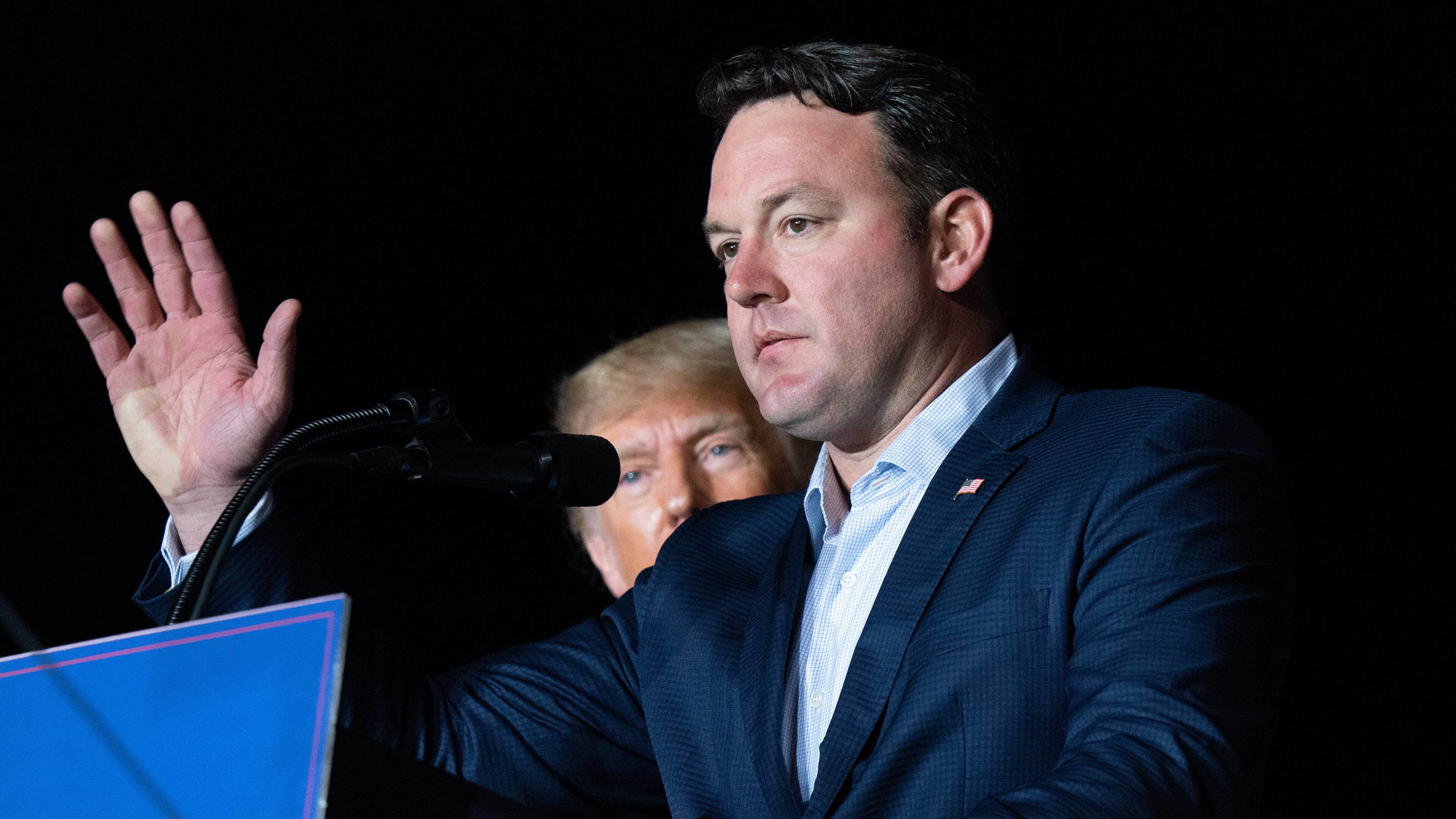Trump case shines light on court bid to oust Burt Jones

The Colorado Supreme Court’s decision to disqualify Donald Trump from the primary ballot set off a political earthquake with aftershocks that spread to Georgia, where the former president and his allies face legal challenges over their efforts to overturn the election.
It’s unclear whether the Colorado court’s 4-3 decision that Trump is ineligible to run for another term will inspire a similar legal complaint in Georgia, but the plaintiffs behind a separate legal challenge to banish Lt. Gov. Burt Jones from office were emboldened.
Meanwhile, Republicans redoubled their efforts to paint the challenges as a courtroom crusade engineered by Democrats as a new national poll showed the former president with a commanding lead over GOP rivals, even though most voters believe he has committed serious federal crimes.
The “Colorado Supreme Court has done to President Trump what the Third World countries do: used the ‘legal’ system to remove their opponents from the ballot,” Jones said Wednesday.
The Colorado ruling that ordered Trump be removed from the state’s Republican primary ballot found that he violated the U.S. Constitution’s insurrection clause by seeking to reverse his 2020 defeat to President Joe Biden.
It was the first time in U.S. history that Section 3 of the 14th Amendment has been used to disqualify a president, and Trump’s attorneys plan to appeal the “completely flawed” decision to the U.S. Supreme Court, which has the final say on state constitutional issues. Most of the U.S. Supreme Court are Republican appointees.
The Colorado ruling also could trigger a wave of other legal efforts to strike Trump’s name from state primary and general election ballots, though they would face hurdles.
“You’re going to see people attempt to make these types of similar, parallel cases in Georgia and other places,” said Anthony Michael Kreis, a Georgia State University professor who specializes in constitutional law.
“But at the end of the day it’s not necessary because I think we all know the Supreme Court is going to resolve this once and for all,” he told the Politically Georgia podcast. “How much additional information would new lawsuits unearth that would help the Supreme Court make a decision? I think the evidence is pretty well out there.”
Count state Rep. Scott Holcomb among the Georgia Democrats hopeful that Trump critics bring a similar case in Georgia.
“The words are crystal clear and the court applied the facts to the law,” said Holcomb, an Atlanta attorney, of the Colorado ruling. “Courts in Georgia and across the country should come to the same conclusion. But would they? I’m skeptical, but I’d love to be proven wrong.”
‘Doesn’t hurt us’
Jones faces a separate longshot challenge in Butts County Superior Court that was brought by four left-leaning plaintiffs who say in a 47-page lawsuit that the Republican should be disqualified for his role in Trump’s efforts to overturn his 2020 defeat.
They say the lieutenant governor is an “oath-breaking person” because he took a series of steps to undermine Biden’s victory, including serving as a Trump elector and calling for a special legislative session to question the 2020 election results.
Jones countered in court that his actions were designed to preserve Trump’s legal options in case he prevailed in a blitz of lawsuits challenging the results, all of which went nowhere. He cast himself to supporters as a victim of “radical Democrats” bent on subverting the will of voters.
Legal experts call the challenge a longshot at best. Kreis called it “meritless,” and said the Colorado ruling might have even bolstered Jones’ case because it more narrowly defined what it means to offer help to insurrections.
Wayne Kendall, an attorney for the plaintiffs, acknowledged he expects his challenge to be rejected by the judge. But he plans to appeal the case to the Georgia Supreme Court, where he would ask the justices to look favorably on the Colorado decision.
“It doesn’t hurt us, certainly,” he said of this week’s ruling.
‘Self evident’
The legal challenges are part of a coordinated effort by Democrats to disqualify Trump and allies by invoking the 14th Amendment, which bars anyone who swore an oath to “support” the Constitution and then “engaged in insurrection or rebellion” from seeking office.
Similar lawsuits targeting Trump in Minnesota and New Hampshire have been dismissed, while a Michigan judge ruled that it should be up to Congress and not the judiciary to decide whether the former president can seek office again.

Last year the liberal Free Speech for People sought to disqualify U.S. Rep. Marjorie Taylor Greene. After an intense April 2022 hearing, a Georgia judge ruled the challengers had “failed to prove their case” against the Rome Republican.
Separately, Trump also faces criminal charges in four jurisdictions, including the ongoing election-interference case in Fulton County against the former president and 14 remaining defendants.
Each legal challenge also seems to solidify Trump’s base, which has proven loyal as he wages a comeback bid. He has significant advantages in Iowa and other early primary voting states, which begin holding their votes next month.
A poll released Wednesday by The New York Times and Siena College showed that 58% of registered voters believe Trump committed serious crimes, including nearly one-quarter of Republicans. Even so, 64% of GOP primary voters in the poll back his candidacy – more than 50 percentage points ahead of his nearest Republican rival.
Democrats say the race is bound to tighten if there’s a head-to-head rematch between Biden and Trump. During a trip to Wisconsin on Wednesday, Biden told reporters there was no question Trump led an insurrection.
“It’s self-evident. You saw it all,” he said. “Now whether the 14th Amendment applies, I’ll let the court make that decision.”



